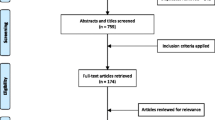Abstract
Objective
Although socially disadvantaged groups are known to have a high risk of poor health the involved mechanisms and psychosocial dynamics are not fully understood. Long-term unemployment and the perception of social justice may both additionally endanger health. We therefore set out to explore the specific impact of these two context variables on self-reported health, health behaviour, and resources in marginalised groups.
Methods
A structured interview survey was conducted in three federal provinces in Austria, which targeted a quota sample of 486 subjects in long-term unemployment.
Results
Both, duration of long-term unemployment and low perceived social justice, are strongly associated with self-reported poor health and low personal (internal) and social (external) health resources. The best differentiation of dependent variables concerning the univariate analyses was found with respect to social health resources, as all variables on this level significantly correlated with perceived social justice but not with duration of long-term unemployment.
Conclusion
While this study does not allow to establish causal relationships, the associations we found suggest that also perceived social justice needs to be taken into account in interventions that are intended to foster equity in health among socially disadvantaged groups.

Similar content being viewed by others
References
Ahmed SM, Lemkau JP, Nealeigh N, Mann B (2001) Barriers to healthcare access in a non-elderly urban poor American population. Health Soc Care Community 9(6):445–453
Antonovsky A (1987) Unravelling the mystery of health. How people manage stress and stay well. Jossey-Bass Publishers, San Francisco, Washington, London
Arnetz BB, Brenner SO, Levi L (1991) Neuroendocrine and immunologic effects of unemployment and job insecurity. Psychother Psychosom 55:76–80
Bolton W, Oatley K (1987) A longitudinal study of social support and depression in unemployed men. Psychol Med 17(2):453–460
Braveman P, Tarimo E (2002) Social inequalities in health within countries: not only an issue for affluent nations. Soc Sci Med 54:1621–1635
Breitwieser U, Donauer B, Elsigan G, Grossmann R (1990) Gesundheitsförderung. Appelle sind zuwenig. Beispiele regionaler Bildungsarbeit. Profil, München
Brondolo E, Thompson S, Brady N, Appel R (2005) The relationship of racism to appraisals and coping in a community sample. Ethnic Health 15(S5):14–19
Coburn D (2004) Beyond the income inequality hypothesis: class, neo-liberalism, and health inequalities. Soc Sci Med 58(1):41–56
Dalbert C (2002) Beliefs in a just world as a buffer against anger. Soc Justice Res 15(2):123–145
Dauer S, Schulze D, Hennig H (1997) Adjusting to illness and secondary prevention in unemployed patients from the medical psychology viewpoint. Wien Med Wochenschr 147:283–286
Dzuka J, Dalbert C (2006) The belief in a just world and subjective well-being in old age. Aging Ment Health 10(5):439–444
Engel G (1977) A new medical model: a challenge for biomedicine. Science 196:129–136
Fazekas C (2006) Psychosomatische Intelligenz. Springer, Wien
Freidl W (1997) The impact of anomia in a demand resource model of health. Soc Sci Med 44(9):1357–1365
Freidl W, Rásky É, Stronegger WJ (1999) Operationalisation of a demand/resource model of health: an explorative study. J Epidemiol Community Health 5:187–188
Henriksson KM, Lindblad U, Agren B, Nilsson-Ehle P, Rastam L (2003) Associations between unemployment and cardiovascular risk factors varies with the unemployment rate: the Cardiovascular Risk Factor Study in Southern Sweden (CRISS). Scand J Public Health 31(4):305–311
Kasl SV, Cobb S (1980) The experience of loosing a job: some effects on cardiovascular functioning. Psychother Psychosom 34:88–109
Kieselbach T (1997) Unemployment, victimization, and perceived injustices: future perspectives for coping with occupational transitions. Soc Justice Res 10(2): 127–151
Kieselbach T (2003) Long-term unemployment among young people: the risk of social exclusion. Am J Community Psychol 32:69–76
Kivimäki M, Ferrie JE, Brunner E (2005) Justice at work and reduced risk of coronary heart disease among employees. Arch Intern Med 165:2245–2251
Lazarus RS, Folkman S (1984) Stress, appraisal, and coping. Springer, Berlin, Heidelberg, New York
Lindström B, Eriksson M (2005) Salutogenesis. J Epidemiol Community Health 59:440–442
Lindström B, Eriksson M (2006) Contextualizing salutogenesis and Antonovsky in public health development. Health Promot Int 21:238–244
Mackenbach JP, Gunning-Schepers LJ (1997) How should interventions to reduce inequalities in health be evaluated? J Epidemiol Community Health 51(4):359–364
Piette P (2002) Working together to reduce health inequalities: reflections on a collaborative participatory approach to health research. Aust N Z J Public Health 26(4):332–336
Rogers WA (2004) Evidence based medicine and justice: a framework for looking at the impact of EBM upon vulnerable or disadvantaged groups. J Med Ethics 30(2):141–145
van Lenthe FJ, Schrijvers CT, Droomers M, Joung IM, Louwman MJ, Mackenbach JP (2004) Investigating explanations of socio-economic inequalities in health: the Dutch GLOBE study. Eur J Public Health 14(1):63–70
Weiner H (1991) Der Organismus als leib-seelische Funktionseinheit—Folgerungen für eine psychosomatische Medizin. Psychother Psychosom Med Psychol 41:465-481
Wilkinson RG (1997) Socioeconomic determinants of health. Health inequalities: relative or absolute material standards? BMJ 314:591–595
Acknowledgements
This common initiative EQUAL was funded by the Social Fund of the European Union (ESF) and the Federal Ministry of Economics and Labour of the Republic of Austria. The authors would like to thank Christiane Roth for assistance in translating and preparing the manuscript.
Author information
Authors and Affiliations
Corresponding author
Rights and permissions
About this article
Cite this article
Freidl, W., Fazekas, C., Raml, R. et al. Perceived social justice, long-term unemployment and health. Soc Psychiat Epidemiol 42, 547–553 (2007). https://doi.org/10.1007/s00127-007-0207-y
Accepted:
Published:
Issue Date:
DOI: https://doi.org/10.1007/s00127-007-0207-y




